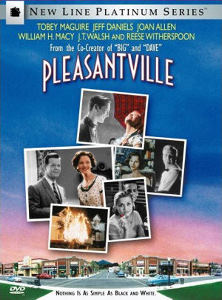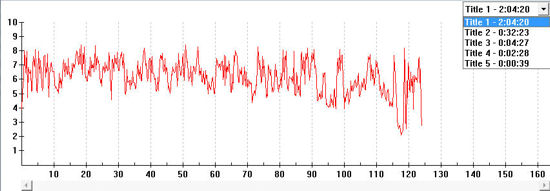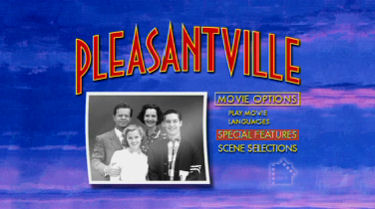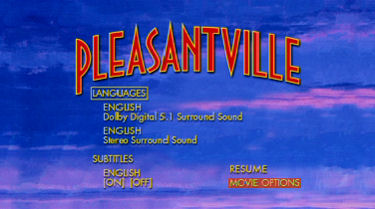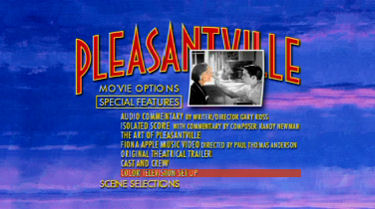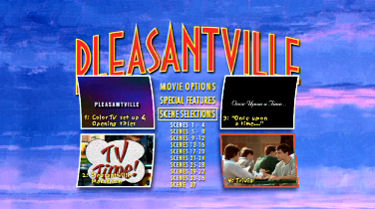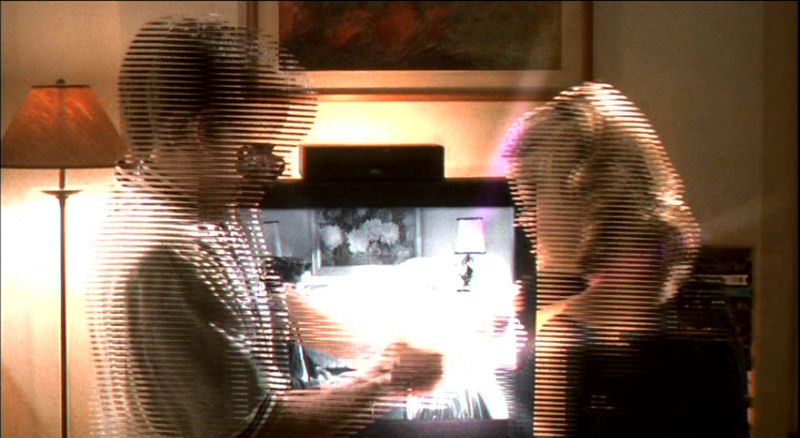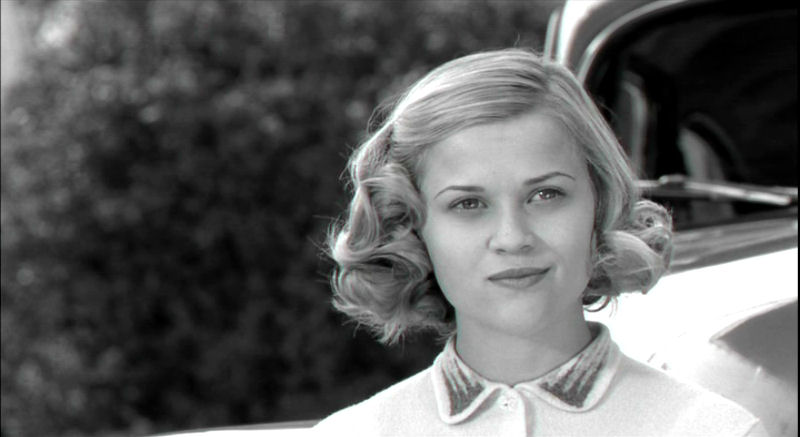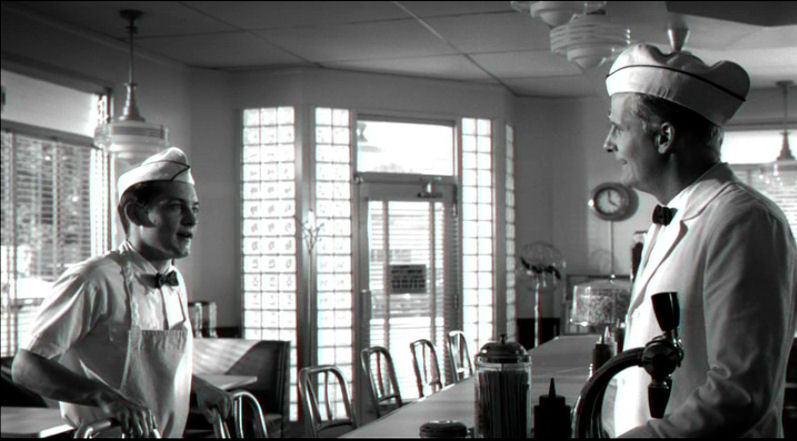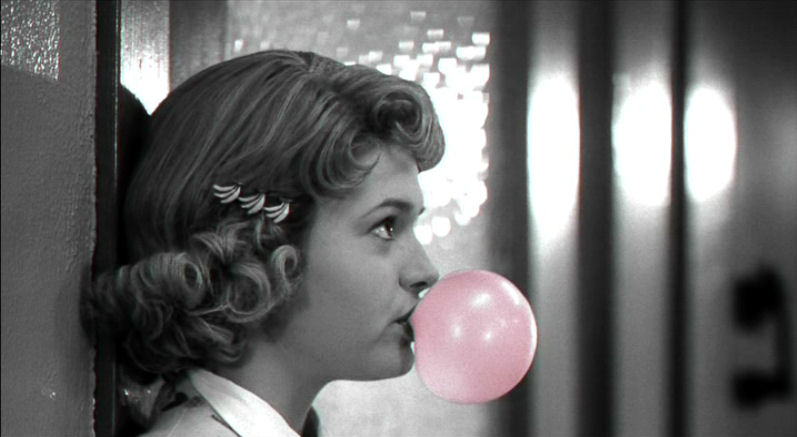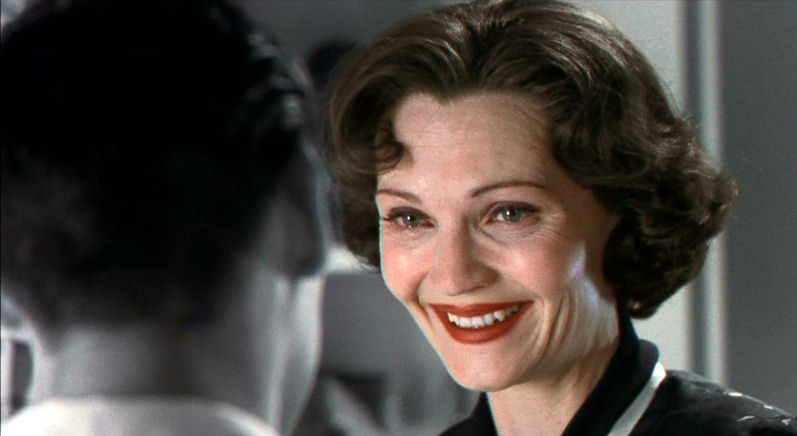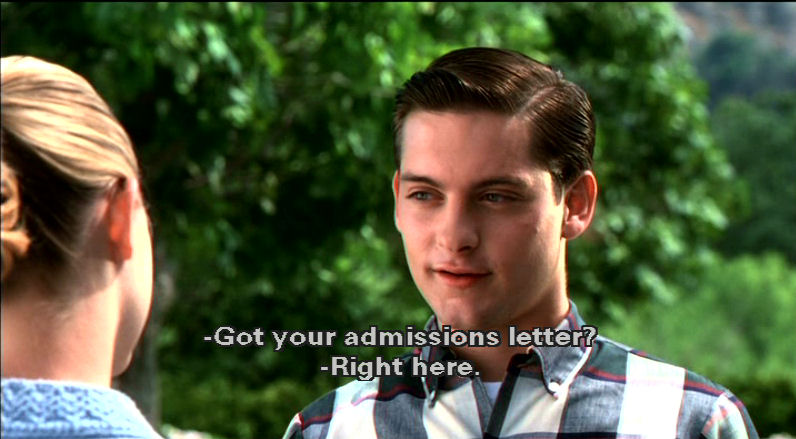![]()
![]()

![]()
![]()

directed by Gary Ross
US 1998
The signs are all around us: modernity
brings apathy, dysfunction and nihilism in its wake! And when we add
global warming, the AIDs epidemic, or any other recent calamity to this
unhappy mix, the picture becomes even bleaker. How tempting, then, a
return to apparently simpler times; a return to, say, the halcyon days
of the 1950s.
This impulse is exploited by debut director Gary Ross’ intelligent
comedy ‘Pleasantville’ (1998), which transplants its ‘Generation Y’
protagonists – the bickering siblings, David (Tobey Maguire) and
Jennifer (Reese Witherspoon) – into the black-and-white world of a 1950s
sit-com. However, it soon becomes clear that Pleasantville’s rosy veneer
is maintained by a repressive value system which stifles any “wayward”
emotions – such as the sexual longing of the housewife Betty (Joan
Allen), or the artistic inclinations of the soda-jerk Bill (Jeff
Bridges) – and which stands as a barrier to true happiness. Far from
being corruptive, David and Jennifer’s modern ways actually enlighten
Pleasantville’s residents and catalyze the town’s gradual transformation
into vivid Technicolor.
Despite ‘Pleasantville’’s thematic and technical cleverness, there is a
worry that its sit-com setting risks undermining the film’s central
message. Can we really conclude that modern ways are in some way
superior to those of the past, when that past is equated with a
television show's representation of it? Further, as the true 1950s were
significantly less repressive than their 'Pleasantville' incarnation,
might we attack Ross for cynically establishing a faux-50s which ensures
the superiority of a real 90s? Such an attack may only be made if there
is an internal imbalance: that is, if the film’s 1990s passages pertain
to reality in a manner that the 1950s passages do not. Luckily this is
not the case. The 90s sequences – with their familiar jock, slut, geek
and dull teacher tropes – are as much a pastiche as the sit-com
elements. The overall comparison is not an unfair one between truth and
untruth, but is, instead, one between two untruths; a comparison
between, say, MTV and ‘The Adventures of Ozzie and Harriet’.
However, this analysis risks reducing 'Pleasantville', and its message,
to nought – why should we pay attention to a film which supports twin
illusions? There are two immediate answers: firstly, the televisual
clichés inject a humour that social realism would erode. And, secondly,
it should be remembered that falsehoods often bear truths, and that even
the illusions of the popular media serve to reveal the Zeitgeist. If MTV
is significantly more liberated than ‘The Adventures of Ozzie and
Harriet’, then ‘Pleasantville’’s central claim – that modern life is
more liberated than that of the 50s – is hard to doubt.
To its further credit, ‘Pleasantville’ unfolds this central claim
without smugness. Whilst late 20th Century ways are in many respects
portrayed as progressive, the film also makes it abundantly clear that
in other areas – such as civic pride, kinship and courtesy – they
represent regress. The message is that we have a similar amount to learn
from the past as it has to learn from us. Indeed, it is no accident that
the person who, initially, most demonstrates the characteristics of
Generation Y – that is, the sluttish and egotistical Jennifer – is the
character who undergoes the greatest degree of change in the film. At
the film’s ending, she chooses to prolong her stay in Pleasantville; a
tacit acknowledgement, perhaps, that 1950s values are corrective and
that she requires a larger dose of them.
If ‘Pleasantville’ is guilty of anything, then it is an intermittent
tendency to overreach. Alongside its straightforward comparison of
values, the film also broaches the Civil Rights Movement; an almost
Heideggerian celebration of Being; the Third Reich; and historical
fatalism. These topics are too much for ‘Pleasantville’’s central visual
metaphor to bear, and their complacent inclusion often does an
intellectual disservice to the original movements or ideas.
In the end, though, any of ‘Pleasantville’’s problems are swamped by the
film’s immense charm. Indeed, 'Pleasantville' stands alongside the works
of Preston Sturges and Frank Capra as an example of truly well-meaning
satire: a film which uplifts just as swiftly as it lampoons, and which
celebrates as fiercely as it critiques. It is fitting that
'Pleasantville'’s very existence supports its optimistic message: when
even modern Hollywood can produce so delicate a treasure, times can’t be
that bad after all…
Posters
.jpg) |
.jpg) |
Theatrical Release: October - 1998 - Austin Film Festival
Reviews More Reviews DVD Reviews
DVD Review: New Line - Region 1 - NTSC
| DVD Box Cover |
|
CLICK to order from: |
| Distribution |
New Line Region 1 - NTSC |
|
| Runtime | 2:04:26 | |
| Video |
1.85:1 Original Aspect Ratio
16X9 enhanced |
|
|
NOTE: The Vertical axis represents the bits transferred per second. The Horizontal is the time in minutes. |
||
| Bitrate |
|
|
| Audio | Dolby Digital 5.1 | |
| Subtitles | English | |
| Features |
Release Information: Studio: New Line Aspect Ratio:
Edition Details: Chapters 38 |
|
| Comments: |
An impressive film receives an impressive DVD treatment from New Line. The anamorphic transfer – with decent contrast and vibrant colours – capably handles Pleasantville’s mixed colour-scheme and allows the film’s beautiful imagery to dazzle. The Dolby Digital 5.1 sound also excels, particularly in regard to Pleasantville’s excellent soundtrack (which includes numbers by the Dave Brubeck quartet, Miles Davis and Etta James, as well as Fiona Apple’s superb cover of the Beatles’ ‘All Across the Universe’).
As for the extras, they include two lively commentaries from
writer-director Gary Ross and composer Randy Newman; a 30 minute
making-of featurette which details the film’s special effects;
and, perhaps most importantly, the music video for Fiona Apple’s
rendition of ‘All Across the Universe’, as directed by the
incomparable Paul Thomas Anderson. |
DVD Menus
|
|
|
|
|
|
Screen Captures
Not the worst combing ever - just the scene in which our heroes enter the television!
|
|
|
|
|
|
|
|
|
|
|
|
Subtitle sample
|
|
| DVD Box Cover |
|
CLICK to order from: |
| Distribution |
New Line Region 1 - NTSC |
|
![]()
![]()
![]()
![]()
